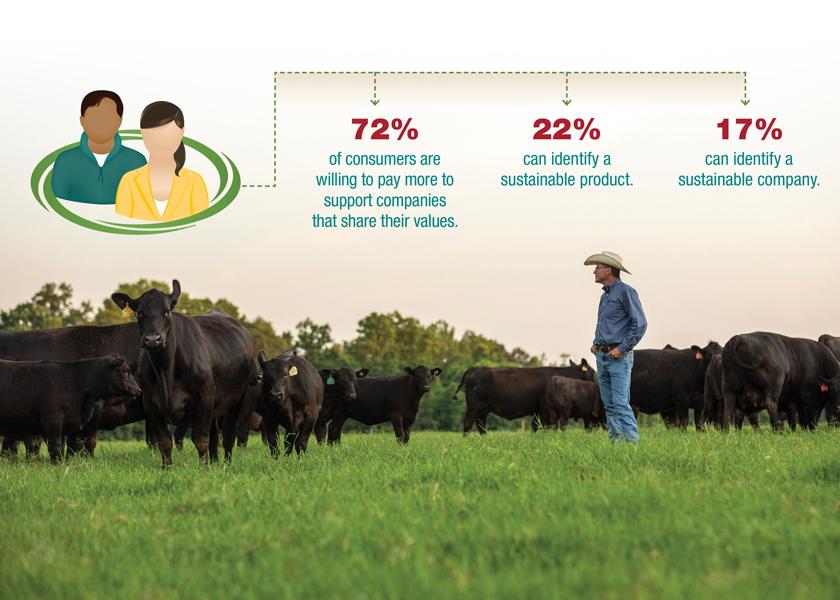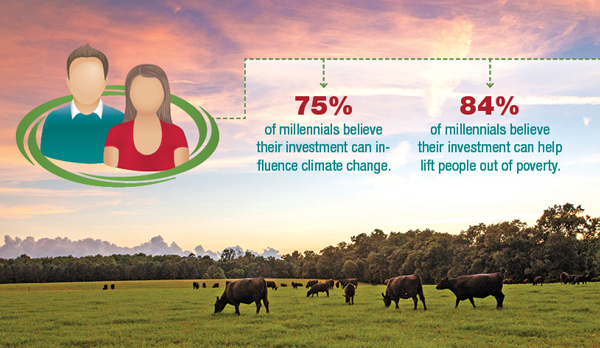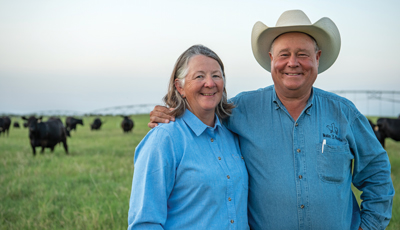Driven to Sustainability

Daniel Humm’s restaurant, like so many others during the pandemic, had to lay off all its employees and was facing the prospect of bankruptcy. As businesses began to reopen earlier this year, Humm decided to gamble with a trendy, yet risky concept. In May he announced Eleven Madison Park, his three-Michelin-star restaurant in New York, would go completely plant-based.
By going meatless, Humm knew his customer base would shrink to a smaller niche of diners. Dinner remained $335 per person without the meat and before the wine.
Humm and many of his patrons believe the U.S. food system requires less meat consumption to be sustainable long-term. That belief is shared by an increasing number of consumers.
Evidence of growing consumer consciousness of sustainability is found in the Hartman Group’s report, “Sustainability 2021: Environment and Society in Focus,” which revealed 72% of consumers are willing to pay more to support companies that share their values.
Such support is not just for everyday products such as food. Credit Suisse, the Swiss global investment bank with $1.5 trillion under investment management, finds 75% of millennials believe their investments can influence climate change, and 84% believe their investments can help lift people out of poverty.
“That’s why we saw companies invest more than $30 billion in sustainability initiatives last year,” says Kim Stackhouse-Lawson, director of AgNext at Colorado State University.
That observation was confirmed by Credit Suisse CEO Thomas Gottstein who told CNBC the coronavirus pandemic had “substantially accelerated the trend toward ESG and sustainability” and sought to highlight the investment opportunity within the overall space. ESG stands for environmental, social and governance, and investors are increasingly applying those non-financial factors as part of their analysis.
“The demand that we see, both from our private clients but also institutional clients, for ESG compatible products is ever increasing,” Gottstein explains. “It’s clearly seen as, also, an opportunity to improve returns.”

The “S” Word
U.S. cattle producers have embraced changing consumer demands before. Over the past 30 years they’ve dramatically improved their products, using genetics to trim waste fat and management to improve cattle health and well-being. This year nearly 82% of carcasses will grade Choice or Prime, up from 54% just 15 years ago, a 35% increase. Carcasses grading Prime, just 2.6% of production in 2006, reached 10.2% in 2020.
With genetic and management improvement, the U.S. produces the same amount of beef today as it did in 1975 with one-third fewer cows. Producers can rightly ask: Isn’t that sustainable ranching?
The answer, says Frank Mitloehner, professor and air quality specialist in cooperative Extension in the department of animal science at the University of California, Davis, is to accept consumer desires.
“Twenty years ago I overheard two cattlemen talking after I had just given a presentation,” Mitloehner says. “One said, ‘I like (Mitloehner), but I wish he wouldn’t use the S-word all the time.’”
Those two cattle producers were industry leaders in Texas, Mitloehner says, and over the years they have organized sustainability conferences in Texas. Why the change? They told Mitloehner that even if they didn’t agree with everything about sustainability, “it’s not as important as it is for us to listen to out customers demands.”
Mitloehner says the five pillars of sustainability are: environment, animal welfare, food safety, people/labor and financial viability.
“Those five areas are covered in what we call stewardship,” he says. “What rancher wouldn’t say that they are the best steward they can be of the land, the animals and the products they produce?”
Sustainability is just the word used by our customers, and ranchers should embrace that.
“Being a good steward means to work sustainably,” Mitloehner says. “And that’s what ranchers should be proud of. You should not be afraid of (sustainability), you should own this term.”
Early Adopters
Three years ago, Tyson Fresh Meats announced a partnership with Progressive Beef, a cattle management and sustainability program for feedlot operators based in Manhattan, Kan. Progressive Beef maintains accountability and transparency through a verification system that involves USDA-approved auditors. The feedyards certified in the program focus their efforts in three areas: cattle care, food safety and environmental sustainability, and are verified twice per year.
Today, more than one million head of cattle are cared for annually through the program at certified feedyards, helping Tyson meet consumer demand for beef that “creates a higher confidence level for consumers.”
Sustainability initiatives are also important for programs such as Certified Angus Beef (CAB). Now in its 44th year, CAB recorded sales of 1.25 billion pounds in 2019 thanks to an unyielding focus on product quality and programs designed to assist its retail and food service customers — the front line for sales and consumer satisfaction.

Bradley 3 Ranch, Certified Angus Beef Sustainability
Award winners for 2021. Photo: Abbie Lankitus
Last year CAB launched an award specifically for producers who have embraced the concept. The Bradley 3 Ranch (B3R) near Memphis, Tex., earned the 2021 award that recognized 60 years of investment and management that has produced amazing results in a harsh environment.
Minnie Lou Bradley, her daughter, Mary Lou, and her husband, James Henderson, developed a plan for B3R to help conserve the 18" of annual rainfall and promote the grass while managing a quality-forward seedstock business. Those efforts have helped the B3R cowherd double in size.
Now, sustainability at B3R is as much about the efficiency and quality of the cattle as it is about land and water. They’ve built indexes around the performances of their cattle, and they focus on cows that can raise a calf, breed back, do it on minimal resources and maintain their flesh.
Corporate Investment
Nearly every major U.S. food processing company is already heavily invested in sustainability. JBS, for instance, announced in March a commitment to achieve net-zero greenhouse gas (GHG) emissions by 2040. The commitment spans the company’s global operations, including its diverse value chain of agricultural producer partners, suppliers and customers in their efforts to reduce emissions across the value chain.
In June, Tyson Foods announced its ambition to achieve net-zero greenhouse gas (GHG) emissions across its global operations and supply chain by 2050.
Cargill has committed to reduce GHG emissions by 10% by 2025 and reduce GHG emissions in its supply chain by 30% per ton of product sold by 2030. Further, Cargill has committed to improving the livelihood of 10 million farmers by 2030 through training in sustainable agricultural practices.
In April, Cargill and Sysco, the world’s largest broadline food distributor, announced a major partnership with the National Fish and Wildlife Foundation (NFWF) that will help ranchers across Colorado, Kansas, New Mexico, Oklahoma and Texas tackle the impacts of climate change as well as improve grasslands and wildlife habitat by creating one of the largest sustainable beef cattle grazing efforts in the nation.
With hundreds of millions of dollars invested, those companies are showing consumers their commitments to sustainability and efforts to mitigate climate change, but the stakes are far higher than the beef supply chain.
The $30 billion invested in sustainability by companies is an investment driven by consumers and investors who are focused on the climate.
“Bloomberg reports there is $35 trillion invested in publicly traded companies under that environmental, social and governance (ESG) umbrella,” Stackhouse-Lawson explains. “And that’s up 15% from the start of 2018, and it represents 36% of all professionally managed funds.”
Those are the financial stakes and the pressure that are coming at publicly traded companies to focus on sustainability.
“This new ESG pressure will continue to shift capital toward sustainable products,” Stackhouse-Lawson says. “Now we have stronger, more connected supply chains that are not just driven by profits, they’re also rewarded for their social, environmental and governance metrics.”
While cattle producers might already have a great sustainability story, it is also paramount that they recognize the need for effective communication.
“It is important to acknowledge when talking about sustainability that emotion and science are on equal footing,” Stackhouse-Lawson explains. “If you put them in a head-to-head race, emotion wins in the sustainability space nearly every time.”







